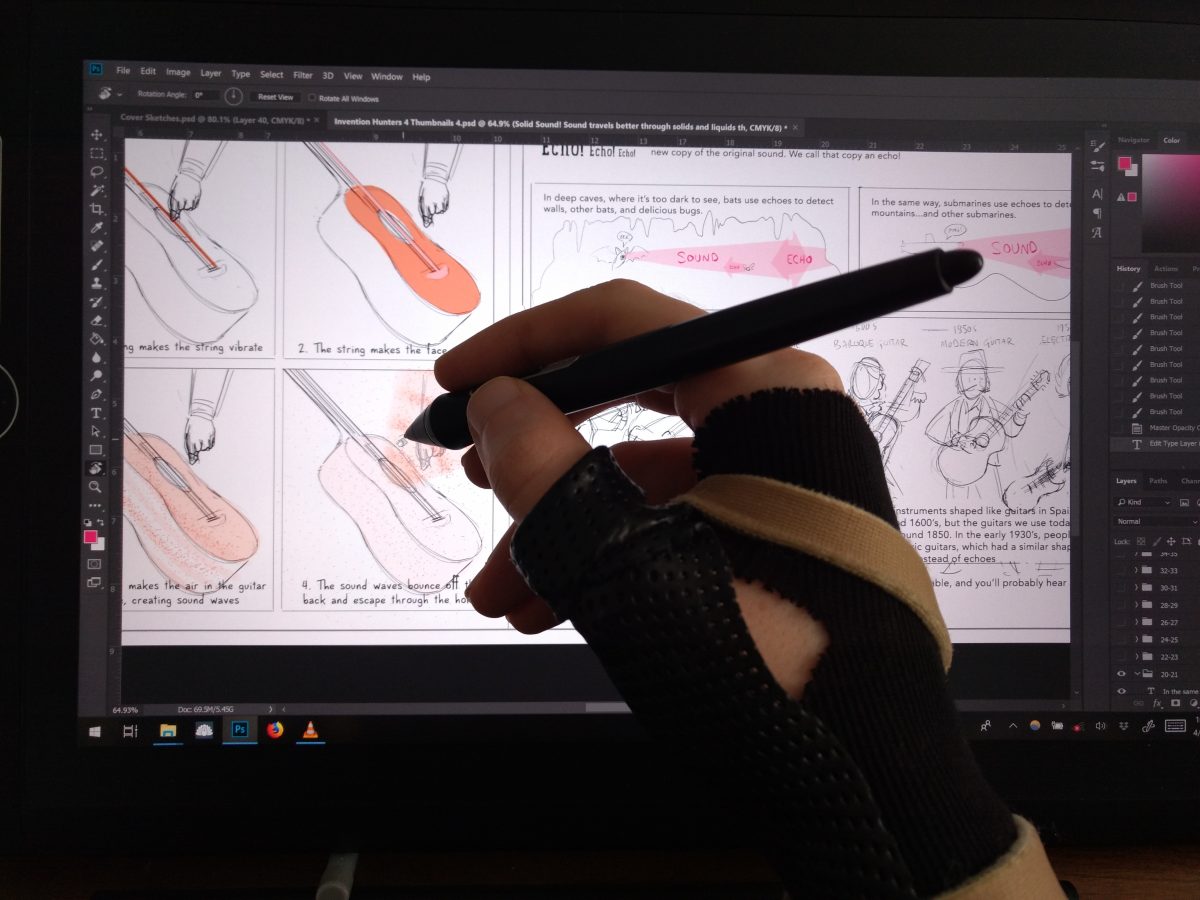“Black or Blue?” she asks.
The young man hesitates, before answering.
An illustrator/author is a person who writes and then draws and paints pictures that clarify his writing (for people like me). Subjects can cover everything from comics to mythical creatures to science concepts.
In the case of this young New York artist, it’s all three. His blog, Veritable Hokum started a few years ago with comics telling funny stories from history (my favorite is The Emu War (http://www.veritablehokum.com/comic/the-emu-war/). His book about myths, Gods and Heroes, came out last spring. The Invention Hunters, a series of four books explaining science concepts to elementary school kids, starts hitting store shelves this July.
When he’s not illustrating his own books, he illustrates other authors’ books. Busy guy.
Illustrators (and artists) earn their living with one hand, like professional pitchers or quarterbacks. If a professional athlete injures that key hand, it can be career ending. Ditto illustrators and artists. With one important exception: professional athletes have multi-million dollar incomes to cushion disaster; freelance artists don’t.
This young man is typical, a struggling artist on the cusp of success. It isn’t easy. His latest deadline requires months of long days spent researching, writing, and illustrating concepts like magnetism, electricity, and leverage, in a form that appeals to school kids. (His solution: four goofball academics – The Invention Hunters – parachute into places with mysterious things they’ve never seen, like toilets and jackhammers. They guess – badly – at what these things do and how they work, until an elementary school student sets them straight.)
After months of drawing, his hand becomes so painful, he can’t use it. He buys an arm brace. Nothing. Even a simple circle is impossible.
Specialist’s appointments, if you can find one, are usually months off. He perseveres and finds one. He describes his pain and work deadline.
“Any opening in the next week or so?”
“No. Goodbye.”
New Yorkers can be very efficient.
When a publisher calls with a contract to start illustrating another author’s new book that week, he has to turn it down.
With no other choice, he takes his first break in over a year to visit his father in Florida for a week. Better to ponder his dwindling career in Florida sun than in New York sleet. Although he doesn’t say it, he is scared.
That’s when he gets lucky.
A friend of his father recommends a Dr. Douglas Carlan in St. Petersburg. He gets an appointment for a few days later – with one call. When they learn he doesn’t have insurance, instead of rejecting him, they allow a modest cash payment. They x-ray his hand.
(Wait! What? No “your call is important to us”? No “we’re booked, try the ER”? No “the doctor’s out; you can see the PA”? … What?)
Dr. Carlan actually listens as the young man describes his work, the pain in his hand, and his time constraint, then checks the x-ray and methodically and carefully examines the hand. He finds the exact pain center and diagnoses a severely inflamed ligament. He smiles and tells the young man there is no permanent damage.
He writes a prescription for a brace and therapy: “There’s an office down stairs. Go right now and ask for Elizabeth. She’s really good.”
The young man goes to the ground floor. Elizabeth, who is leaving for the day, stops to listen to his story.
“I can’t take a lot of time, because I have to pick up my daughter, but…”
She grabs some thick plastic sheets, one blue, one black.
“Black or blue”, she asks.
“Uh…black, please.” (He is from New York, after all.)
As he answers, she is already measuring his hand. She cuts three Velcro strips, then cuts the black plastic to fit his forearm, warms it on a machine to make it pliable, and gently wraps it around his forearm, securing it with the Velcro.
The pain, once part of his life and future fear, immediately begins ebbing away. While he is moving his fingers and marveling at his newfound freedom, Elizabeth writes down some exercises to strengthen his wrist.
Then, “Sorry. I have to pick up my daughter. Call me if you have a problem!”
She waves and is gone.
On the way home, the young man calls the publisher he had turned down. He asks if the contract is still open. The answer isn’t quite “For you? Yes!” But it is pretty close.
Now that’s a happy ending.
Is this story just wishful thinking in light of today’s healthcare mess? Nope, it really happened. I know. I was there.
